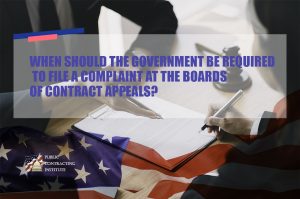The rules of the Armed Services Board of Contract Appeals (“ASBCA”) and the Civilian Board of Contract Appeals (“CBCA”) require that within 30 days after the docketing of an appeal, the appellant [contractor] must file a complaint setting forth its claims in simple, concise and direct terms. ASBCA Rule 6(a); CBCA Rule 6(b). A recent case discussed the situation when the Board reversed the rule, and required the Government to file the complaint. Transworld Systems, Inc. v. Dep’t of Education, CBCA 6049, March 1, 2018.

Transworld concerned a government claim made by the Department of Education (“ED”) demanding that Transworld repay $1.3 million in alleged overpayments that ED had made. The Board explained that Transworld was appealing ED’s claim, not its own, and it is only the unique procedural requirements of the Contract Disputes Act that all appeals to the Board must be initiated by the contractor, “even if the appeal is from a government claim and even if the government, rather than the contractor, bears the ultimate burden of proof,” citing Ralph Muhammad v. Dept of Justice, CBCA 5188, 16-1 BCA ¶ 36,267.
The Board noted that it typically expects the contractor initiating the appeal to file the complaint. The mere fact that an appeal involves a government claim or that the Government has the burden of proof in an appeal is insufficient, in and of itself, to justify a shift in responsibility to the Government for preparing and filing the complaint. However, there are exceptions to that general presumption. The Board then explained the exceptions:
- To ensure that a tribunal has adequate notice of the claim and its grounds, the Board may exercise its discretion to direct the Government to file the complaint, if doing so will facilitate efficient resolution of the appeal.
- If relevant information concerning the basis for the claim resides with the Government and not the appellant
- The main goals in deciding which party should submit the complaint are ensuring that all parties have fair notice of the grounds of the government claim, and maximizing efficiency in the process of development and resolution of the appeal.
- The key component in allocating responsibility is “whether the appellant possesses sufficient information about the government claim to allow it to craft a complaint that will be useful in defining and narrowing the issues in dispute.”
In this case, Transworld asserted that it lacked sufficient detailed account-level information about ED’s overpayment to allow it to craft a viable complaint. However, the Board noted that in crafting a complaint, great generality would be allowed in circumstances, occurrences and events in support of the claim—as long as the government received fair notice of the claim. The contracting officer suggested that since Transworld had been provided a copy of ED’s audit report, the company should have the basic information needed to prepare the complaint.
In ruling that ED should be required to prepare the complaint, the Board noted two important points: (1) the burden to ED of having to prepare the complaint should be minimal under the circumstances; and (2) ED informed the board that another case currently pending before the Board might have common issues of law or fact. ED advised that it was considering requesting consolidation of both appeals, and the Board concluded that having ED file the complaint in this appeal offered the “best chance of providing the Board with an understanding of ED’s claims in both appeals at an earlier stage of proceedings (which will be necessary if ED requests consolidation or coordination of the appeals) and ultimately of streamlining the dispute process.”
The Takeaway: Although the contractor is generally required to file the complaint at a BCA, the Board will certainly consider a motion to require the government to file the complaint, under certain circumstances. The most important of the factors to be considered is “whether the appellant possesses sufficient information about the government claim to allow it to craft a complaint that will be useful in defining and narrowing the issues in dispute.” Even though the appellant possessed an audit report regarding the overpayments, the Board believed that because there was another, similar case that might be combined with this appeal, having the agency file a complaint would likely be the most efficient approach, and provide streamlining for the dispute process.
For other helpful suggestions on government contracting, visit:
Richard D. Lieberman’s FAR Consulting at https://www.richarddlieberman.com/, and Mistakes in Government Contracting at https://richarddlieberman.wixsite.com/mistakes/.
